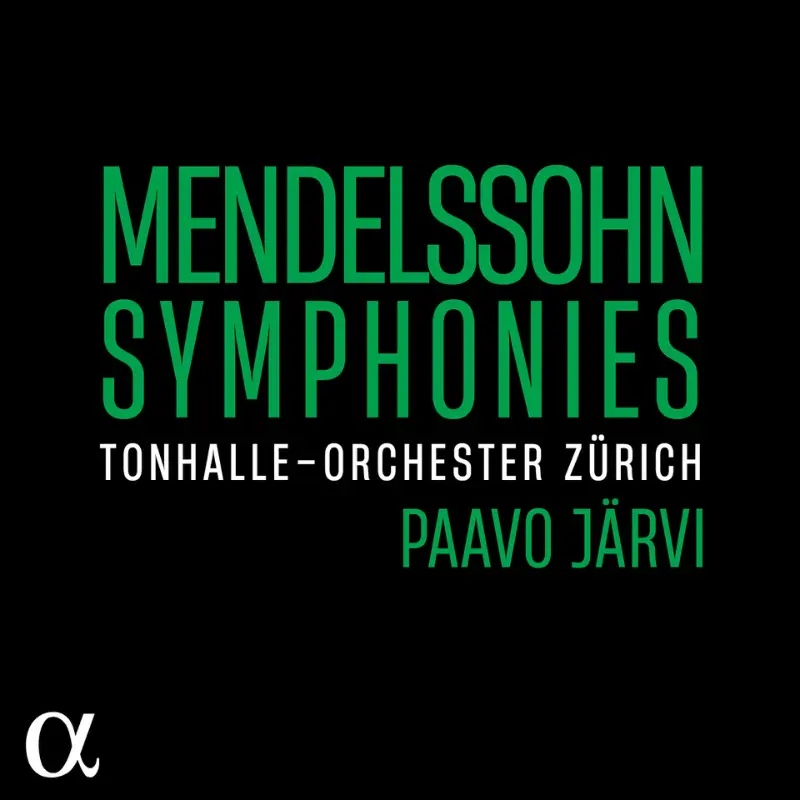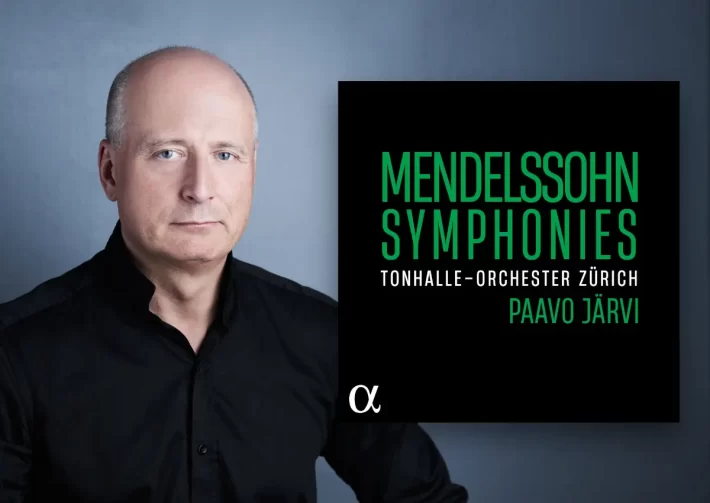Having recorded his Beethoven, Brahms, and Schumann symphony cycles with the Kammerphilharmonie Bremen, one might have assumed Paavo Järvi would go on to record this Mendelssohn series with them, especially since they feature historically informed performance practice (HIPP). But this Zurich orchestra is quite familiar with HIPP, having adopted its principles in many recordings under their previous Music Director, David Zinman. And while those Bremen readings are played by a chamber orchestra, these new performances utilize a larger orchestra.

In earlier reviews of Tchaikovsky and Bruckner played by this partnership, I often suggested that late-Romantic repertoire does not always suit Järvi’s emotional temperament. But Mendelssohn’s early Romanticism is a better emotional fit, and the playing throughout this series is engaged and enthusiastic.
The orchestral playing is excellent across the board, Järvi’s tempos are quick, even by HIPP standards, but the playing is masterly. Vibrato is sparingly used, and the characterful winds are well to the fore. Timpani are, for the most part, played with hard sticks and have a strong presence, aided by Alpha’s rich yet detailed engineering. Textures are transparent, drawing our attention to inner detail without ever overwhelming primary melodic material.
Järvi’s speedy tempos mar an otherwise impressive reading of the first symphony. The opening movement is undeniably thrilling, but overly driven, as if it is an orchestral etude. Manacorda in Potsdam is about two minutes slower, but in that extra time he shapes the musical argument with far more subtlety and a greater variety of color. Järvi’s sweetly played slow movement skims the emotional depths when compared to Manacorda, Abbado (London Symphony Orchestra/DG), and Gardner (City of Birmingham Symphony Orchestra/Chandos). Yet the last movement’s fugal writing (track 4, starting 3’06” ) is voiced to perfection.
Things improve with the fifth symphony (the second to be written), its opening Andante carefully shaped, conjuring an expectant atmosphere. The playing embraces a large dynamic range (sample the quiet intensity of the Dresden “Amen” passages), with plenty of power when required, contrasted with playing of gossamer delicacy. The second movement has a delightful balletic grace, and the final movement, which can so often seem episodic, has a sweeping dramatic arch.
The second symphony features inspired singing by the soloists and Zurich Sing-Akademie, balanced to be an integral part of the aural picture. Diction is excellent at every dynamic level, and Järvi again leads a performance in which each section flows into the next with a natural inevitability. The fifth movement, taken at a fluid tempo, is particularly beautiful, and the organ in the closing measures of the final movement has tremendous presence.
The Scottish symphony is stronger still. The opening ‘Andante con moto’ has a potent atmosphere, its autumnal color the result of the careful blending of woodwinds and violas. The Allegro un poco agitato (with perhaps a bit more agitation than Mendelssohn intended) is thrilling, and Järvi makes the most of the storm music. Järvi and the orchestra find the emotional core of the Andante and bring plenty of vivid drama to the final movement, the coda’s tempo changes perfectly judged, generating triumphant joy as the horns really ring out.
The Italian symphony is well done, though the opening movement never smiles in the way that Gardner in Birmingham or Mackerras (Orchestra of the Age of Enlightenment/Erato) do. The second movement’s tempo is challengingly brisk (could pilgrim’s ever walk this fast?) but the third movement has a graceful flow, setting up the final movement’s urgent and enthusiastic Saltarello, featuring plenty of bite from the strings.
The eight movements of incidental music from “A Midsummer’s Night Dream” are a substantial bonus. The performance is, as expected, on the quick side, and if it lacks the sheer joy and sensuousness of Abbado’s Berlin Philharmonic recording (Sony), it has more joy de vivre than either the Gardiner (LSO Live) and Dasugaard (Swedish Chamber Orchestra/BIS) readings.
With first class ancillary materials (including all sung texts and translations) and an excellent price (4 CDs for under $40 at the time of writing this review), this set is warmly recommended.
Image © Kaupo Kikkas
Mendelssohn – Symphonies – Recommended Comparisons
Abbado | Masur | Séguin | Gardiner

Album Details |
|
|---|---|
| Album name | Mendelssohn – Symphonies |
| Artists | Tonhalle-Orchester Zürich, Paavo Järvi – Conductor |
| Soloists | Chen Reiss – soprano | Marie Henriette Reinhold – soprano | Patrick Grahl – tenor |
| Choir | Zürcher Sing-Akademie |
| Catalogue No. | ALPHA 1004 |
| Label | Alpha / Ourhere |



















